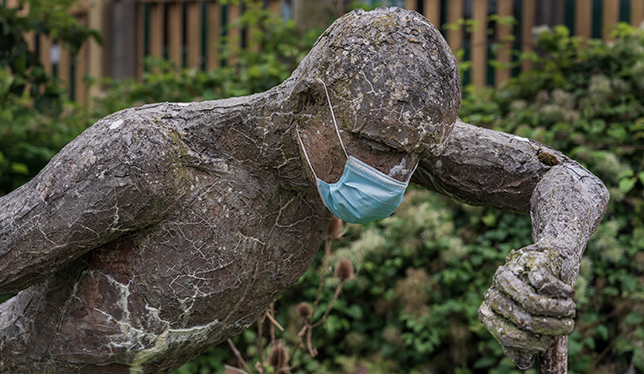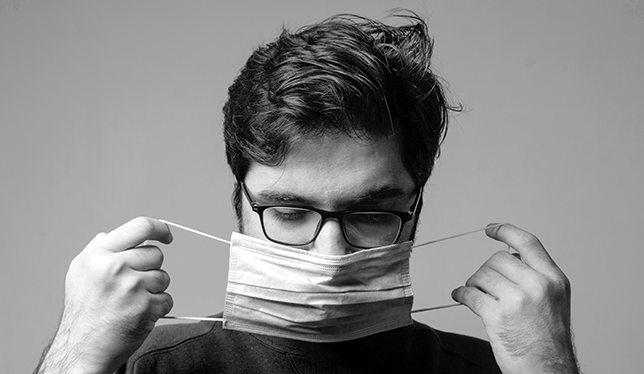COVID-19 is hurting PhD students’ mental health
Here are three ways Canadian universities can do more to help.

When I started my PhD three years ago, I had no clue how much of a toll it would take on my mental health. Even before the pandemic, I found the work to be stressful and isolating. After COVID-19 struck, these challenges were compounded; not only could I no longer visit a friend for coffee or visit my therapist, but I now had deeper concerns about my ability to pay my rent, complete my program on time and find a job once I’m done.
I’m not the only one struggling: mental illness is on the rise among graduate students and postgraduates in Canada. A recent study led by the Toronto Science Policy Network (TSPN) found that nearly 75 percent of master’s and PhD-level students across disciplines, surveyed from 45 different Canadian institutions, reported declining mental health directly related to the pandemic. These students are experiencing high levels of stress, anxiety, depression, and feelings of being overwhelmed. Women and under-represented student groups, including people of colour and members of the LGBTQ community, are at even greater risk for mental illness. Universities could do a much better job in responding to the challenges faced by their students: only 39 percent of those surveyed in the TSPN study reported that they feel their institution is offering sufficient mental-health support. Here are three ways universities can help.
Virtual counselling
While many Canadian universities offer on-campus counselling services to students, few reacted quickly enough following the pandemic to ensure that professional support could be offered remotely, such as via telephone or Skype. Universities should ensure that teletherapy services are available to all students free of charge, and faculty should encourage students to access these supports before, not during or after, signs of mental illness. This proactive approach will mean that mental-health supports can do more to mitigate stress and anxiety before they hit.
More supervisor check-ins
Working remotely means that PhD students are getting less one-on-one time with their supervisors. Virtual check-ins make it even more difficult for supervisors to gauge the wellness of students. Supervisors may also feel it is outside of their purview or skillset to ask about mental wellness or offer support. For many PhD students, however, these intermittent check-ins are the only time they interact with faculty members of their university. These calls can be important spaces for sharing their struggles and frustrations, and seeking help. Supervisors should consider increasing the number of check-ins they offer, as well as shifting the objective of these meetings to go beyond academic guidance to demonstrating concern for student well-being. Of course, supervisors themselves are likely facing unprecedented work overload and burnout, making it difficult for them to find the time and energy to provide adequate attention to their students. This means that universities must also consider the mental-health needs of their faculty.
Model work-life balance
While many university faculty members are abiding by institutional health guidelines, like wearing masks in public and maintaining social distancing, there remains much that could be done in terms of modeling good work-life balance for students. With working from home becoming commonplace during COVID-19, maintaining a schedule can be difficult as the distinction between weekdays and weekends becomes blurred. I have heard from many colleagues about receiving emails from their supervisors in the evening or on a Saturday. Supervisors likely adapt their schedules to make space for the challenges of working from home, such as balancing grading with homeschooling their children. However, these irregular work hours can result in making students feel pressured to follow suit, leading to burnout. Teachers and supervisors should be aware of the stress they may be causing among their students by not setting and respecting specific work hours.
Mental illness is on the rise among Canadian PhD students as a direct result of COVID-19. Universities should implement institutional changes that increase student access to virtual counselling services as well as encourage supervisors to increase contact and provide a healthy precedent for a balanced lifestyle. With no immediate end in sight for the pandemic and remote working likely to continue, it is more important than ever for Canadian universities to ensure proactive and sufficient mental-health support for its graduate students.
Megan Douglas is a Canadian PhD student at the University of Edinburgh. She is currently conducting a research project on researcher mental health for Canada’s International Development Research Centre.
Featured Jobs
- Veterinary Medicine - Faculty Position (Large Animal Internal Medicine) University of Saskatchewan
- Canada Excellence Research Chair in Computational Social Science, AI, and Democracy (Associate or Full Professor)McGill University
- Psychology - Assistant Professor (Speech-Language Pathology)University of Victoria
- Business – Lecturer or Assistant Professor, 2-year term (Strategic Management) McMaster University















Post a comment
University Affairs moderates all comments according to the following guidelines. If approved, comments generally appear within one business day. We may republish particularly insightful remarks in our print edition or elsewhere.